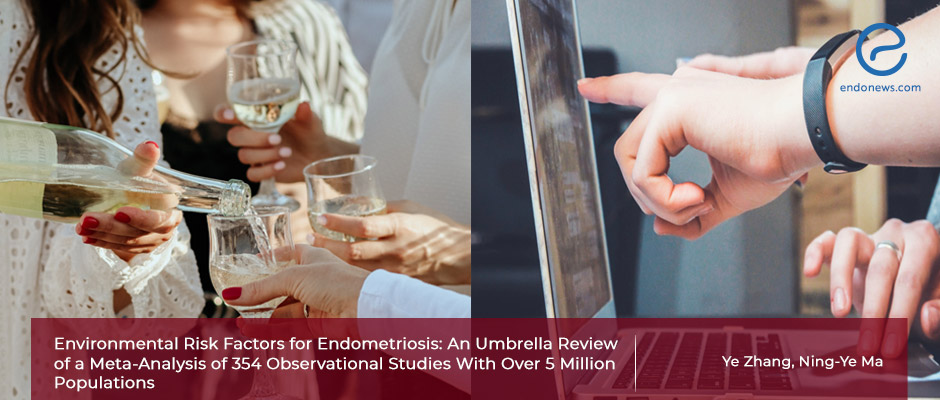Which of the suggested environmental risk factors are indeed related to endometriosis?
May 18, 2022
A review study reveals only two of the many suggested environmental risk factors may be potential risk factors for endometriosis
Key Points
Highlight
- Among the many environmental risk factors that are proposed to be associated with endometriosis, alcohol intake and exposure to endocrine disruptor chemicals were seen to be the most suggestive of all.
Importance
- Correctly identifying environmental risk factors for endometriosis is crucial in defining the patients who are at higher risk for the disease.
- By having the knowledge, screening programs better assess patients preclinically.
What’s done here
- This is an umbrella review of all the review studies and meta-analyses that identified the environmental risk factors and their association with endometriosis.
- The methodology and evidence that the studies provided were assessed.
- The associations with statistically significant results were then graded as convincing, highly suggestive, suggestive, weak evidence, or non-significant associations.
Key results
- Twelve studies with 40 meta-analyses that analyzed data from around 140.000 cases and a 5-million population showed there were around 40 different environmental risk factors that were associated with endometriosis.
- Of these, only any alcohol intake and exposure to endocrine disruptor chemicals were found as suggestive evidence for endometriosis.
Strengths & Limitations
- This is the first systematic and comprehensive assessment of the potential association between environmental factors and the risk of endometriosis using a robust analysis and evaluating biases and methodological limitations.
- The analysis relies upon the articles cited by the original authors and the results that have already been published in systematic reviews and meta-analyses.
- The statistical tests cannot prove the existence of bias or its exact source.
- The quality of the preliminary studies for individual components was not assessed.
- False negatives may exist, particularly for associations with limited evidence.
Lay Summary
Endometriosis is a complex disease with genetic and environmental factors in its poorly understood pathogenesis. Even though many epidemiological studies in the literature have proposed several risk factors, the lack of clear establishment and modification of these potential risk factors persists.
Doctors Zhang and Ma from Shenyang, China, have performed an umbrella review where they analyzed all the systematic reviews and meta-analyses about the association between environmental risk factors and endometriosis and tried to assess the methodology and evidence that the studies provided. The review was published in the October 2021 issue of the journal Frontiers in Medicine.
After carefully selecting the publications, summary effect sizes and study heterogeneity, prediction intervals, small-study effects, excess significance bias, and methodological quality were evaluated. The associations with statistically significant results were then graded as convincing, highly suggestive, suggestive, weak evidence, or non-significant associations.
A total of 12 articles with 40 meta-analyses that were published between 2012 and 2020 were selected for review. There were 40 environmental risk factors associated with endometriosis based on data from around 140.000 cases and a 5-million population. There was a wide range of environmental risk factors such as the ones related to lifestyles, reproductive factors, early life factors, and others, including vitamin D levels, body mass index, exposure to endocrine disruptor chemicals, phthalate metabolites, and race/ethnicity.
When evidence was graded, no association was found in terms of convincing and highly suggestive evidence. However, the associations of two risk factors were found as suggestive evidence for endometriosis, namely any alcohol intake and exposure to endocrine disruptor chemicals, which indicated a strong, significant, and positive association with endometriosis. Studies showed alcohol consumption had effects on oxidative stress as well as hormonal disorders. Endocrine disruptive chemicals were shown to have effects on ER signaling.
Moderate/regular alcohol intake, the length of the menstrual cycle, pre-term birth, low birth weight, exposure to diethylstilbestrol in utero, feeding pattern, vitamin D levels, body mass index, polychlorinated biphenyls, organochlorine pesticides, phthalate esters, mono-(2-ethyl-5- hydroxyhexyl) phthalate, and race/ethnicity were among the 15 risk factors that presented weak evidence. The authors stated that this could be due to the high heterogeneity and small-study effect/excess significant bias, and more research is needed to prove these results better.
Research Source: https://pubmed.ncbi.nlm.nih.gov/34760897/
endometriosis environmental risk factors umbrella review alcohol intake

